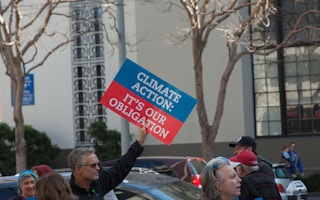Economist Robert Pindyck of the Massachusetts Institute of Technology recently examined the computer models that estimate the effects and costs of climate change — and he didn’t like what he found. The models reflect two gaping uncertainties, he says. First, we don’t know how much increased atmospheric carbon dioxide (CO2) will raise global temperatures. “There are feedback loops” — interactions between greenhouse gases and weather — “that aren’t easy to measure.” The models make assumptions. Next, he says, we don’t know what economic losses will result from higher temperatures. More assumptions. The “damage functions” in the models, he says, “are completely made-up.”
Pindyck sounds like a “global warming denier.” He isn’t. True, he thinks climate change and its adverse economic consequences could be wildly overstated. He also thinks they could be wildly understated. The effects might ultimately be catastrophic. We simply don’t know. Ignorance reigns. The best course, he says, would be to adopt a modest carbon tax — because there are certainly some ill effects of global warming — and adjust it as we learn more. Meanwhile, we shouldn’t assume that computer models convey scientific truth. “The models create an illusion of knowledge,” he says. “For me, the issue is being honest.”
I’d call Pindyck a global warming pragmatist, and it’s a middle path that I find appealing. It acknowledges warming’s uncertainties but doesn’t use them as an excuse for inaction. For years, I’ve advocated an energy tax — my preference now is a carbon tax — because it could advance other national goals. It could reduce budget deficits and enhance energy security by pushing consumers toward more efficient cars and trucks. That’s my standard: Support policies that, though they might address climate change, can be justified on other grounds.
“
The US Energy Information Administration (EIA) forecasts that, despite assumed rapid growth in wind and solar, fossil fuels will still provide almost four-fifths of global energy in 2040
It’s a partial solution, because there is no complete solution. If global warming is as dangerous as alarmists claim, we can’t do much about it. The world now gets roughly 80 per cent of its energy from fossil fuels (oil, coal, natural gas), whose burning is the main source of man-made CO2. Unless there’s some technological breakthrough, there’s no way to replace this energy without shutting down much of the world economy. The US Energy Information Administration (EIA) forecasts that, despite assumed rapid growth in wind and solar, fossil fuels will still provide almost four-fifths of global energy in 2040.
Moreover, total energy use over these decades is expected to increase by about 50 per cent, says the EIA, mainly reflecting poor countries’ quest for economic growth and higher living standards. This means CO2 emissions would rise about 50 per cent and come mostly from poor nations. A 2012 study by the World Resources Institute, an environmental group, found that nearly 1,200 new coal-fired plants had been proposed worldwide, three-quarters of them in China and India.
By contrast, greenhouse emissions in the United States, Europe and Japan are projected to be flat over the next three decades. In the United States, this reflects more efficient vehicles, a shift from coal to natural gas for electricity generation (natural gas has about half of coal’s emissions), more renewables and an overall less-energy-intensive economy. In Europe and Japan, sluggish economic growth and stagnant or declining populations also depress demand.
Still, climate policy is mired in paralysis. It is not that people disbelieve warming. In a Pew poll released Nov. 1, 84 percent of Democrats and 46 percent of Republicans agreed there is “solid evidence the earth is warming.” But concrete action founders on three political obstacles.
First, it requires collective agreement. All major countries, including China, must join; otherwise, the declining emissions of some will be swamped by the gains of others. Understandably, poorer countries are reluctant to renounce the cheap energy they need to reduce poverty.
Second, it requires that governments inflict pain (higher energy costs) on today’s citizens for hypothetical gains (less global warming) for tomorrow’s citizens. The politics are ugly.
“
[Climate policy] requires collective agreement. All major countries, including China, must join; otherwise, the declining emissions of some will be swamped by the gains of others. Understandably, poorer countries are reluctant to renounce the cheap energy they need to reduce poverty
Third, environmentalists have described the outlook for global warming in such dire terms that it’s doubtful that any set of plausible policies would avert calamity. If failure is fated, why bother?
There’s no obvious way around these obstacles. Why not try something different? The crux of the matter is putting a price on carbon — through a tax on oil, coal and natural gas — that reflects global warming’s costs. This would promote energy efficiency and favor renewables. The trouble, as Pindyck says, is that we don’t know what that tax should be, because we don’t know global warming’s full effects.
But we do know the size of the budget deficit, and we do know that revenue from a carbon tax might help finance a simplification of the income tax. By addressing multiple problems, an admittedly unpopular carbon tax might command broader support. Who knows? It might even pass.
Robert J Samuelson is a weekly columnist for The Post, writing on political, economic and social issues. This post originally appeared here.








